 Garda public-order unit getting ready to baton-charge protesters at Coolock, Dublin 5, in July 2024
Pic: Eamonn Farrell/RollingNews.ie
Garda public-order unit getting ready to baton-charge protesters at Coolock, Dublin 5, in July 2024
Pic: Eamonn Farrell/RollingNews.ie
Bodycam evidence used to secure conviction
Garda bodycam footage has been used in the prosecution of Philip Dwyer for failing to obey a direction to move on during riots in Coolock, Dublin, last year.
Frontline gardaí began using the body-worn cameras last year, and this is the first case where the technology was used to secure a conviction.
The anti-immigration activist was given a two-month suspended sentence by Judge John Hughes at Dublin District Court yesterday (13 February).
Dwyer (56), of Tallaght, Dublin 24, denied failing to comply with a garda direction and refusing to give gardaí his name and address under the Public Order Act on 15 July at Malahide Road.
The unrest followed Government-announced plans to use the local disused Crown Paints factory to house hundreds of international protection applicants.
Cleared
Following legal submissions by defence counsel Luke O'Higgins, the accused was cleared of refusing to tell gardaí his name but was found guilty of failing to comply with a direction to leave the area.
He was fined €500 and ordered to report to the Probation Service every three months for the next two years.
The court was told he was a trainee journalist who freelanced for sporadic income, totalling about €500 a year, and was otherwise reliant on social welfare.
The former property manager and window repair man also had funds donated for his equipment.
Live-streaming to 13,000 followers
He told the court he had been in the Coolock area reporting on a subject of national interest. He was live-streaming to 13,000 followers at the time.
Dwyer told the court he was ‘singled out’ and said that he followed a direction given to him by Detective Inspector Alan McDevitt, who was in charge of a Public Order Unit with full riot gear.
The garda told the court that the accused tried to interview him immediately after he was given the direction to leave.
Judge Hughes found that Dwyer had not obeyed and did not leave immediately, as required under the law, in a peaceable and orderly manner.
Gazette Desk
Gazette.ie is the daily legal news site of the Law Society of Ireland